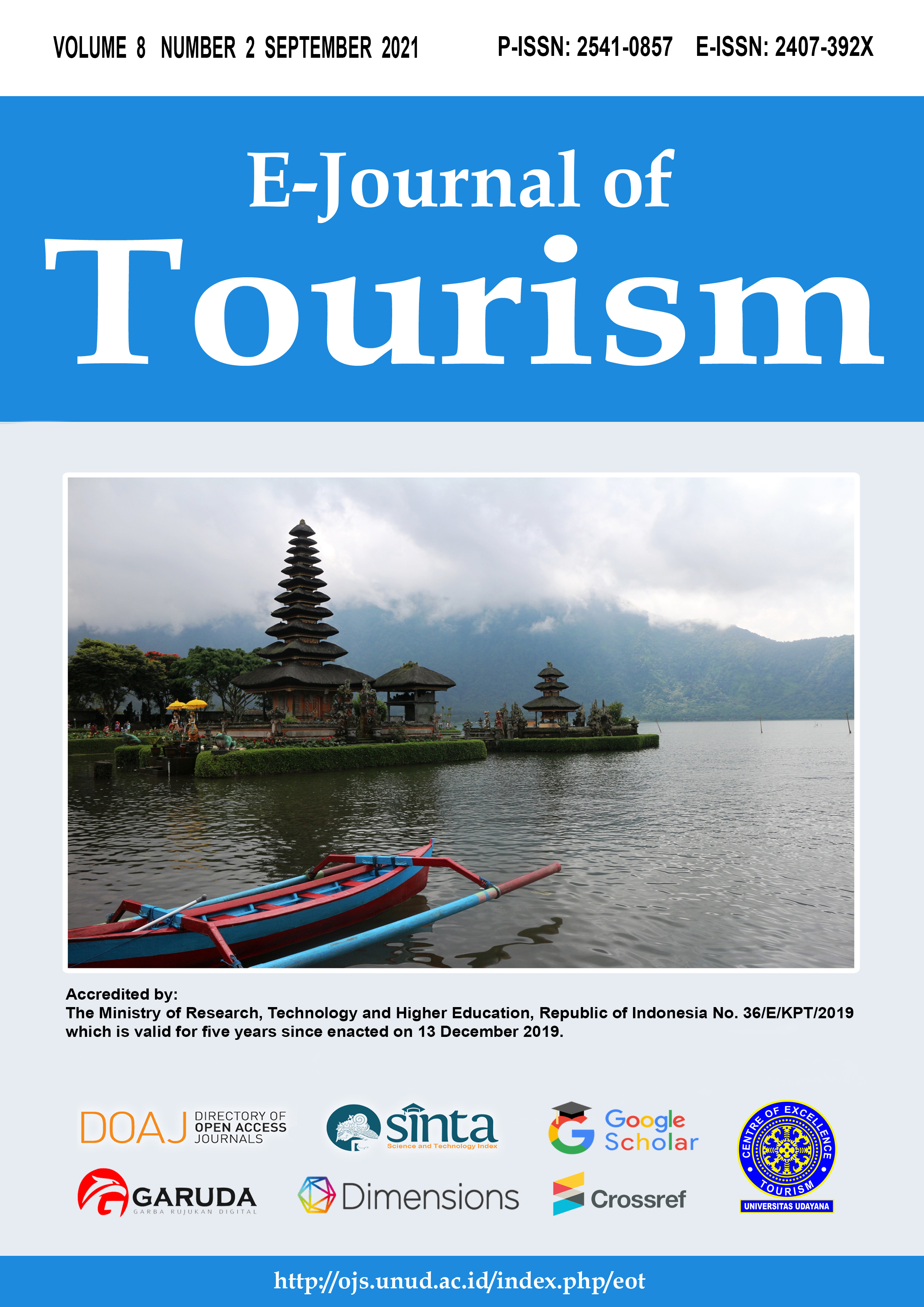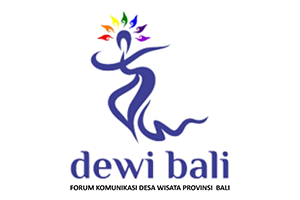The Urban Heritage Tourism Development Strategies in Gajah Mada Denpasar Heritage Area Based on The Visitors’ Satisfaction
Abstract
Market driven is one of the aspect of tourism development strategy approaches. The purpose of this research is intended to formulate development strategies for Gajah Mada Denpasar Heritage Area as an urban heritage tourism destination based on the level of visitors’ satisfaction. This research is based on descriptive quantitative method. The data used in this study are qualitative and quantitative data that obtained through literature study, observation, interviews and questionnaires to 100 respondents who had experienced on visiting Gajah Mada Heritage Area before the Covid-19 pandemic in Indonesia. Data were analyzed using Importance Performance Analysis (IPA) and supported by descriptive analysis methods. The results showed that the development strategy needs to be emphasized on intensify the bad performance of the tourism destination elements in quadrant I and maintain the good performance of the tourism destination elements which are the part of quadrant II, based on the Cartesian quadrant’s result.
Downloads
References
Hair, et al. 1995. Multivariate Data Analysis 6 Ed. New Jersey: Pearson Education.
Hariani, Yuni Sulpia, IGA Oka Suryawardani, IK Surya Diarta. 2020. Kepuasan Wisatawan terhadap Elemen Daya Tarik Wisata Pantai Kuta Lombok. JUMPA, 6 (2), 2020.
Hasan, A. 2015. Tourism Marketing. Yogyakarta: Center for Acadenic Publishing Service.
Ngamsomsuke. Waraporn., Tsorng-Chyi Hwang., Chi-Jui Huang. 2011. Sustainable Cultural Heritage Tourism Indicators. Taiwan: Department of Applied Economics.
Mill, R.C., Alastair M. Morrison. 2009. The Tourism System. United States of America: Kendall Hunt Publishing Company.
Oliver, R. L. 2010. Satisfaction: A Behavioral Perspective on The Consumer. New York; Routledge.
Paturusi, Samsul Alam. 2008. Perencanaan Kawasan Pariwisata. Denpasar: Udayana University Press.
Pendit, I Nyoman. 1999. Ilmu Pariwisata, Sebuah Pengantar Perdana. Jakarta: PT. Pradnya Paramita.
Pitana, I Gde & Diarta, I Ketut Surya. 2009. Pengantar Ilmu Pariwisata. Yogyakarta: Andi Publishing.
Pothof, Rolf. 2006. Urban heritage tourism: A Case Study of Dubrovnik. Bournemouth University, UK: European Tourism Management.
Rachmawati, I.N. 2017. Pengumpulan Data Dalam Penelitian Kualitatif: Wawancara. Lembar Metodologi. Jurnal Keperawatan Indonesia, 11(1), 35-40.
Rangkuti, F. 2002. Measuring Consumer Satisfaction. Jakarta: Gramedia Pustaka Utama.
Rangkuti, F. 2002. Analisis SWOT: Teknik Membedah Kasus Bisnis. Jakarta: Gramedia Pustaka Utama.
Suarmana, I Wayan Restu, I Wayan Ardika, I Nyoman Darma Putra. 2017. Pengembangan Pusat Kota Denpasar sebagai Heritage Tourism. JUMPA, 4(1) 2017, 62-77.
Tengkere, Ellen Grace, Lorraine W. Th. Sondak. 2017. Tingkat Kepuasan Pengunjung terhadap Kualitas Pelayanan Daerah Wisata Puncak Temboan Tomohon. Jurnal Agri-Sosioekonomi Volume 13. No. 1.
Utama, I Gusti Bagus Rai, Mahadewi, N. M. E. 2012. Metode Penelitian Pariwisata dan Perhotelan. Yogyakarta: Penerbit Andi.
Weiler, B. & Hall, C. M. 1992. Special Interest Tourism. London: Belhaven Press.
Widiastuti, Resti Dwi. 2017. Analisis Kepuasan Wisatawan Kota Bandung Berdasarkan Tourism Experience. Jawa Barat: Universitas Telkom.
Widyastuty, AAS Alit. 2011. Urban heritage tourism Kawasan Jl. Thamrin Denpasar. Jurnal Teknik WAKTU, 9 (1) 2011.
Wu, Yue. 2018. Developing a Sustainable Urban heritage tourism Approach for Philadelphia - Experiences from National Heritage Areas. University of Pennysylvania, Philadeplhia.
Yoeti, Oka A. 1985. Pengantar Ilmu Pariwisata. Bandung: Angkasa.

This work is licensed under a Creative Commons Attribution 4.0 International License.
The copyright of the received article shall be assigned to the journal as the publisher of the journal. The intended copyright includes the right to publish the article in various forms (including reprints). The journal maintains the publishing rights to the published articles.




















